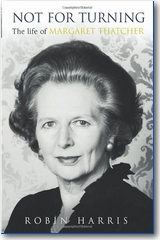
(Margaret Hilda Roberts [birth name]; Baroness Margaret Hilda Thatcher; Iron Lady [nickname])
born on October 13, 1925, in Grantham, Lincolnshire, Great Britain
died on April 8, 2013, in London, Great Britain
British politician; first woman prime minister in British history (1979-1990)
100th birthday on October 13, 2025
Biography
In general, more nonsense was written about the so-called ‘feminine factor’ during my time in office than about almost anything else. I was always asked how it felt to be a woman Prime Minister. I would reply: ‘I don't know. I've never experienced the alternative.’
Margaret Thatcher was the first woman prime minister in British history. She came from a modest background but married entrepreneur Denis Thatcher in 1951, with whom she later had two children.
Her father was the mayor of the small town of Grantham, and she thus came into contact with politics at an early age. After studying chemistry and law, she was elected to the House of Commons as a member of the Conservative Party.
Her fabulous career began after the Conservatives won the general election in 1970 and she was the only woman to be appointed to the Heath cabinet. Five years later, the newcomer was unexpectedly elected leader of the Conservative Party: she had been the only member of the party with the courage to challenge the unpopular incumbent for its leadership. In 1979, she became prime minister.
Thatcher took office with what she described in her memoirs as a “sense of having been chosen.” She wanted not only to lift her country out of economic crisis, but also to implement “radical conservatism and a total political change.” Her reform program was akin to shock therapy. She relied entirely on the self-correcting powers of the market, rigorously cutting subsidies, privatizing state-owned enterprises, and breaking the power of the unions.
Her success seemed to prove her right: in the mid-1980s, there was talk of a “British economic miracle,” and the standard of living rose across broad sections of society. After defeating Argentina in the Falklands War, she was celebrated as a war heroine across the nation. The Iron Lady was elected for two more terms. However, the costs were high. Never since World War II had there been so many homeless, unemployed, and poor people, nor had society been so polarized.
“The lady’s not for turning” – this had been Thatcher’s maxim while successfully fighting for her political objectives. But she increasingly displayed a lack of foresight and political instinct. Her relentless zeal for reform met with growing resistance both among the general population and within her own cabinet.
At the end of the 1980s, the newly imposed poll tax resulted in serious social unrest. When the economy once again fell into a recession and inflation was rampant, Thatcher found herself completely isolated within her own party. On November 22, 1990, she decided to resign.
(Text from 2004; translated with DeepL.com; edited by Ramona Fararo, 2025.
Please consult the German version for additional information, pictures, sources, videos, and bibliography.)
Author: Dorothea Schanen
If you hold the rights to one or more of the images on this page and object to its/their appearance here, please contact Fembio.



